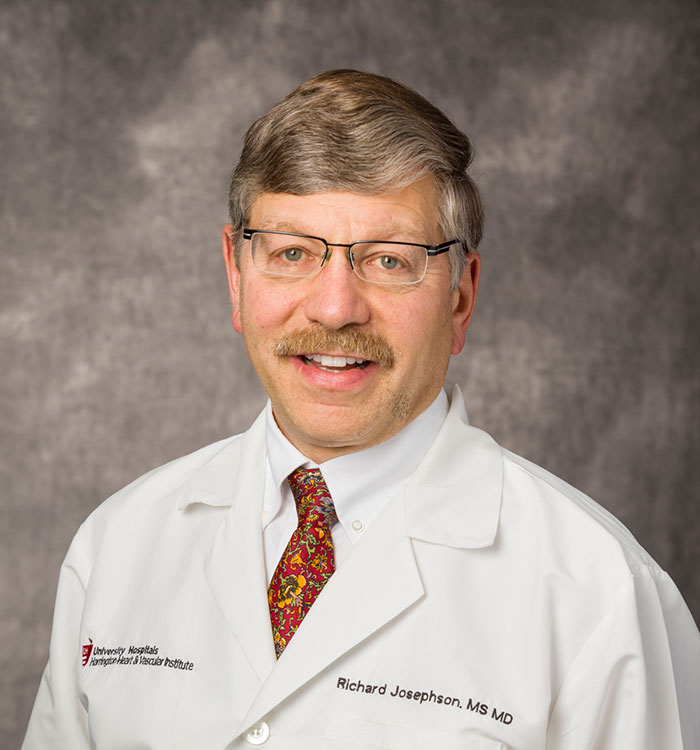UH Expert Creates New Webinar Series for the ACC on Cardiac Rehab
February 04, 2019
The five-webinar series aims to increase physician knowledge and boost lagging participation in this valuable service
Innovations in Cardiovascular Medicine & Surgery - Winter 2019
Cardiac rehabilitation is unquestionably effective. According to data from the Million Hearts initiative spearheaded by the Centers for Disease Control (CDC) and the Centers for Medicare & Medicaid Services (CMS), people who attend all 36 sessions of a typical cardiac rehab program have a 47 percent lower risk of death and a 31 percent lower risk of heart attack than do people who attend only one session.
 Richard Josephson, MD
Richard Josephson, MD“Cardiac rehabilitation is unquestionably a good service that makes people feel better, makes people live longer and probably cuts down on recurrent heart attacks and hospital admissions,” says cardiologist Richard Josephson, MD, Director of the Cardiovascular & Pulmonary Rehabilitation Center at University Hospitals Harrington Heart & Vascular Institute, based at UH Cleveland Medical Center, and Professor, Case Western Reserve University School of Medicine.“But it’s under-utilized. It’s a multidisciplinary intervention, and some physicians are not as engaged as they should be.”
To address this issue, the American College of Cardiology (ACC) asked Dr. Josephson to organize, develop and implement a first-of-its-kind, transformational series of free educational webinars. Now available on the ACC website, the series includes 15 modules grouped into five, one-hour sessions. Dual CME/MOC credit is available. Dr. Josephson contributed three modules and solicited others from national experts in the field of cardiac rehab.
“The idea is to provide a didactic resource for physicians, to educate primarily cardiologists with real information for their patients who could benefit from cardiac rehab,” Dr. Josephson says. “There’s no other one, good, convenient location for physicians to learn this. How do you handle patients who have heart failure – not in general, but when they’re in rehab? What do you do with patients who have pacemakers and defibrillators? These webinars address those important issues.”
With today’s complex cardiovascular care, the need for a good working knowledge of cardiac rehab best practices has never been greater, Dr. Josephson says.
“In some ways, the patients are getting more complicated physiologically, with LVADs, heart transplants and some of the less common care given to these patients,” he says.
Viewers of the five cardiac rehab webinars produced by Dr. Josephson and the ACC will learn:
- Which patients are appropriate for cardiac rehabilitation referral and enrollment
- How to use exercise stress testing before cardiac rehabilitation to develop the exercise prescription and to evaluate improvement and return to work activities after cardiac rehabilitation
- How to construct an exercise prescription for most patients in Phase 2 cardiac rehabilitation
- How to tailor cardiac rehab for patients with systolic heart failure, LVADs, post-heart transplant or frailty
- How to develop an exercise prescription for patients with pacemakers, ICDs or recent valve procedures
- How to screen patients in cardiac rehabilitation for depression or anxiety, and how to motivate patients towards positive behavior change
- How to apply practical pharmacotherapy to enhance tobacco cessation in patients in cardiac rehabilitation
The cardiac rehab webinar series is also being promoted as part of the Million Hearts program, which has a goal of preventing one million acute cardiovascular events by 2022. Million Hearts is working with Dr. Josephson and other national experts in cardiac rehab to achieve this aim by boosting cardiac rehab participation to 70 percent of eligible patients.
“The goal is to save a million lives that would’ve been lost to heart disease,” Dr. Josephson says. “Cardiac rehab is a big piece of that because it’s so effective.”
Visit the ACC website to view the new cardiac rehab webinars. They are available to all at no charge, although non-ACC members will need to create an ACC account.


